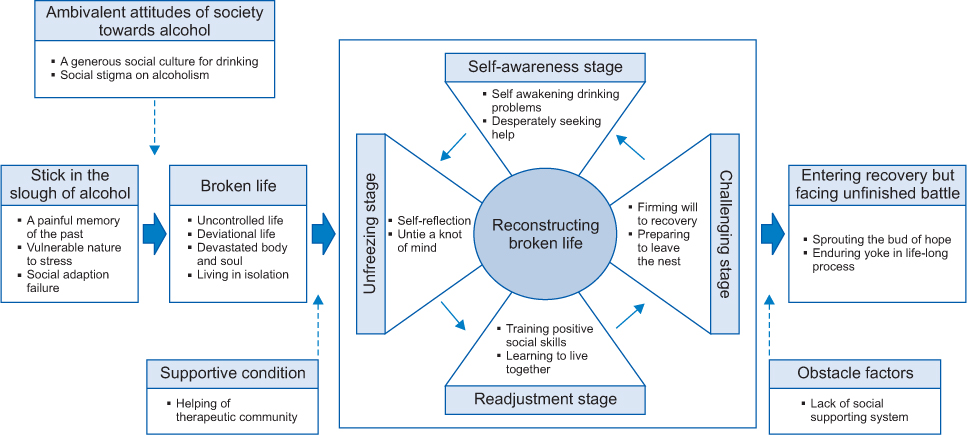J Korean Acad Nurs.
2017 Apr;47(2):267-276. 10.4040/jkan.2017.47.2.267.
The Recovery Process of Alcohol Dependent Men Living in a Therapeutic Community
- Affiliations
-
- 1Department of Nursing, Kkottongnae University, Cheongju, Korea. srkang@kkot.ac.kr
- KMID: 2426352
- DOI: http://doi.org/10.4040/jkan.2017.47.2.267
Abstract
- PURPOSE
The purpose of this study was to explore the recovering process of men who had abused alcohol and has lived in a therapeutic community.
METHODS
Individual in-depth interviews were used to collect data from 10 of these men who has lived in the therapeutic community for more than one year. Qualitative data from field notes and transcribed notes were analyzed using the grounded theory methodology developed by Strauss and Corbin.
RESULTS
The core category about the recovering process of the men who had abused alcohol and are now in the therapeutic community was identified as "reconstructing a broken life". The recovering process of these men in the therapeutic community consisted of four phases; "˜self-awareness stage', "˜unfreezing stage', "˜readjustment stage', and "˜challenging stage'.
CONCLUSION
In this study "reconstructing a broken life", as the core category vividly showed joys and sorrows of men who had abused alcohol and has lived in the recovering process of managing the yoke of life-long disease. In this process of recovery from alcoholic dependence the men gradually adjusted themselves to their given condition. Also they gained coping strategies to care for, and protect themselves. Therefore health care providers can establish supportive programs in the clinical field to empower these men by reflecting their proactive coping strategies.
Keyword
MeSH Terms
Figure
Reference
-
1. Masters C, Carlson DS. The process of reconnecting: Recovery from the perspective of addicted women. J Addict Nurs. 2006; 17(4):205–210.2. Lee SH, Kim HJ, Shin SM. The influences the level of lifestyle has on the rehabilitation of the addiction of the alcoholics who are in a therapeutic community using the DAYTOP model. Korean J Couns. 2012; 13(1):311–324.3. Shin WW. A study on effectiveness of therapeutic community program for homeless alcoholics: Focused on psycho-social changes who maintained treatment for 3 months. Soc Sci Stud. 2011; 35(2):145–179.4. Ministry of Health & Welfare. 2011 The epidemiological survey mental disorders in Korea [Internet]. Seoul: Author;2012. cited 2016 April 8. Available from: http://www.mohw.go.kr/front_new/al/sal0301vw.jsp?PAR_MENU_ID=04&MENU_ID=0403&BOARD_ID=140&BOARD_FLAG=00&CONT_SEQ=266858&page=1.5. Koo JS, Kim CS. Clinical characteristics of male inpatients with alcohol dependence in a alcoholism ward. J Korean Acad Addict Psychiatry. 2012; 16(1):30–37.6. Hood CD. Women in recovery from alcoholism: The place of leisure. Leis Sci. 2010; 25(1):51–79. DOI: 10.1080/01490400306558.7. Seo YN, Jeong HJ, Kim SG, Shin SH, Wi SB, Byun WT, et al. 12-month follow-up rates of alcohol dependent patients at a university hospital. J Korean Acad Addict Psychiatry. 2010; 14(1):24–28.8. Kim SM, Oh GC, Kang HS. Phenomenological study on lived experience of recovering alcoholics in a therapeutic community for homeless: Focusing the experiences of recovering alcoholics who have completed rehabilitation TC program in vision training center for homeless. Korean J Soc Welf Stud. 2013; 44(1):5–31.9. Darke S, Campbell G, Popple G. Retention, early dropout and treatment completion among therapeutic community admissions. Drug Alcohol Rev. 2012; 31(1):64–71. DOI: 10.1111/j.1465-3362.2011.00298.x.10. Shin WW. A study on completion of therapeutic community program for homeless alcoholics. J Korean Alcohol Sci. 2014; 15(2):1–18. DOI: 10.14329/KSAS.2014.15.2.001.11. Korea Federation of Therapeutic Community. The status of institution membership [Internet]. Seoul: Author;2013. cited 2016 May 10. Available from: http://www.kftc2003.or.kr/page_HwqE30.12. Cha JG, Chun YM. The reliability of measurement the effectiveness of therapeutic community programs to alcoholics' recovering. J Korean Alcohol Sci. 2009; 10(1):65–80.13. Lee SH, Shin SM. The influences the spirituality has on the rehabilitation of the addiction of the alcoholics who are in a therapeutic community using the DAYTOP model. Korean J Christ Couns. 2011; 11(22):253–274.14. Charmaz K. Constructing grounded theory: A practical guide through qualitative analysis. London, UK: Sage Publication;2006. p. 260–261.15. Strauss A, Corbin J. Basics of qualitative research: Techniques and procedures for developing grounded theory. 2nd ed. Thousand Oaks, CA: Sage Publications;1998.16. Polifroni EC, Welch ML. Perspectives on philosophy of science in nursing: An historical and contemporary anthology. Philadelphia, PA: Lippincott;1999. p. 68–73.17. Ki SW. Recent psychosocial therapeutic approach on alcohol dependence. J Korean Neuropsychiatr Assoc. 2004; 43(6):646–651.18. Darke S, Campbell G, Popple G. Self-harm and attempted suicide among therapeutic community admissions. Drug Alcohol Rev. 2012; 31(4):523–528. DOI: 10.1111/j.1465-3362.2011.00344.x.19. Shiflett CL, Remley TP Jr. Incorporating case conceptualization drawing in counselor group supervision: A grounded theory study. J Creativity Ment Health. 2014; 9(1):33–52. DOI: 10.1080/15401383.2013.878680.20. White W, Kurtz E. The varieties of recovery experience: A primer for addiction treatment professionals and recovery advocates. Int J Self Help Self Care. 2005; 3(1):21–61.21. Jainchill N, Hawke J, De Leon G, Yagelka J. Adolescents in therapeutic communities: One-year posttreatment outcomes. J Psychoactive Drugs. 2000; 32(1):81–94. DOI: 10.1080/02791072.2000.10400214.22. Yeh MY, Che HL, Lee LW, Horng FF. An empowerment process: Successful recovery from alcohol dependence. J Clin Nurs. 2008; 17(7):921–929. DOI: 10.1111/j.1365-2702.2007.02098.x.23. Jacobson N, Curtis L. Recovery as policy in mental health services: Strategies emerging from the states. Psychiatr Rehabil J. 2000; 23(4):333–341. DOI: 10.1037/h0095146.24. Choi MG. Seoul city operates homeless homes for mental illness and alcoholics. Kyunghyang Shinmun. 2016. 12. 22. Sect. 12A.25. Yeh MY, Che HL, Wu SM. An ongoing process: A qualitative study of how the alcohol-dependent free themselves of addiction through progressive abstinence. BMC Psychiatry. 2009; 9:76. DOI: 10.1186/1471-244x-9-76.26. McTavish FM, Chih MY, Shah D, Gustafson DH. How patients recovering from alcoholism use a smartphone intervention. J Dual Diagn. 2012; 8(4):294–304. DOI: 10.1080/15504263.2012.723312.
- Full Text Links
- Actions
-
Cited
- CITED
-
- Close
- Share
- Similar articles
-
- Factors Affecting Social Problem-solving Ability of Community-residing Alcohol-dependent Patients: Focused on Gender Differences
- Alcohol Intake in Relation to Cardiovascular Risk Factors among (Middle Age) South Korean Men
- Mediating Effects of Hope and Therapeutic Relationship in the Relation between General Social Functions and Mental Health Recovery of Community People with Mental Illness
- Recent Psychosocial Therapeutic Approach on Alcohol Dependence
- Gender Differences in Alcohol Dependence


